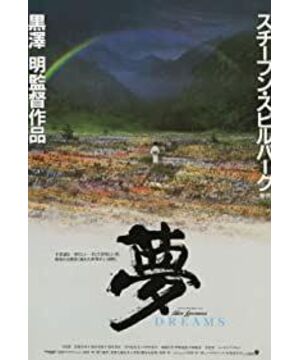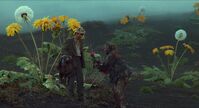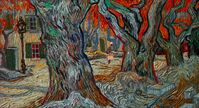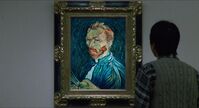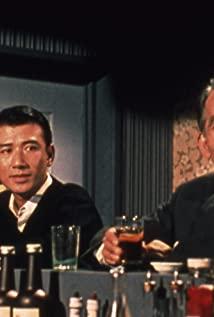It's not because it's too deep and difficult, on the contrary, it's too simple and clear; it's not pure disappointment, so calm down and think about it. It seems that this is in line with his thoughts and style. But, always unwilling, how could a dream come into this? It's like the old Akira Kurosawa frequently changing slides with heavy oil paint and different realistic painting styles, and he keeps narrating on one side: The world will be like this, the world will be like this, this is the future of mankind, we The reality-except that it does not look like a dream.
As Cinekino said, this dream is too real, not dreamy enough, and the old black's skills are all used in real rhythm processing.
I have always thought that since Japan opened its doors to the world and accepted hundreds of schools, two tendencies, or two aesthetics, have gradually formed in Japanese literature and movies. One is to focus on oriental charm in narrative expressions and inheritance. Traditional freehand style, a more realistic style, Westernized techniques, the subject matter and theme are in line with the West, and the personnel in the work must be pointed and implemented. The two factions in the literature are represented by Junichiro Tanizaki, Yasunari Kawabata, Yukio Mishima, and Kensaburo Oe. Later films are reached by Yasujiro Ozu, Kenji Mizoguchi, Akira Kurosawa, and Nagisa Oshima. The pinnacle of both. For Kurosawa's films, people tend to talk about how their subject matter, purpose and Western literature are interlinked, and they have received higher evaluations in the West. This is the reason. I thought he would return to the eastern land he was born and raised in a concluding work like "Dream" when I was old. In fact, the Eastern style is also more suitable for expressing dreams. A more direct and blunt Kurosawa than Westerners and the previous director himself.
Kurosawa's films, from the warmth and despair of the classicists at the beginning, the suspicion and fate of the existentialists, to the later becoming persistent, maybe he is also tired of the disillusionment and powerlessness of doubt and despair, trying to find a way out. Where is the way out? It's not just courage and perseverance that can be found. His hope is stifled everywhere in reality, but he still stubbornly seeks it, and finally turns into a shout in the end. The searchable gesture cannot conceal the nature of despair. This dream of searching for hope is nothing more than a nightmare in the end. It is too persistent and sacrifices the beauty that dreams and art should have.
The eight dreams are in fact a dream. Regardless of natural warfare or social life, they are talking about the same theme: the lost way of mankind. Most of the dreams do not look like dreams in my eyes. Without the uncertainty and ambiguity of dreams, they are just stubbornly using this form to tell an old man's lifelong dedication. It is not so much a dream as it is Kurosawa, who has wide-eyed, faced the illusion of his life in pain. Or his vigilant saying that he just wants to torture your nerves with magical colors and harsh ghost crying, making you completely desperate for this world, and then take action.
My personal favorite is the first dream: sun rain. Beautiful field scenery, misty forest fog, trance to unreal raindrops reflecting the sun's rays, mysterious and quite beautiful traditional Japanese rituals, the family under the rainbow, and the legend of foxes marrying daughters. Only the simple conversation between mother and young son, no preaching, nor pretending to be mysterious, but it made me like the home under the rainbow at once. In fact, it is not the home of the fox, but the home of mankind, mankind and Wanfang Living beings do not invade each other, and each lives in peace and harmony. Life quietly grows under the sunshine and rain with the rhythm of cold and hot, spring and autumn.
The dream of the wheat field, simple, clean, and lonely, the past and the present meet, the reality and the painting blend, the Japanese youth who symbolizes Kurosawa himself walks through Van Gogh’s wheat fields and crows, between the past and reality, reality and illusion In the meantime, it was a real dream, obscure and clear, aimless. The young Kurosawa is lost in Van Gogh's paintings, just like Scorsese, who plays Van Gogh, is lost in Kurosawa's movie world, like human beings are lost in the eternal land.
And Momota. Flowers are blooming during the girl's festival, and when young children hear Xuanyin, the mysterious and elegant mood, and the imagination of young children's feelings, will make people inadvertently infected.
Why didn't Kurosawa continue his dream in this way? Maybe it was really because he was old. He just wanted to eagerly talk about the things that had tormented him all his life, to give himself and future generations an explanation? However, I know that there is another summary work, Antonioni's "Days on the Clouds", but it is so mysterious and transcendent, and it has always been my favorite.
A stubborn, urgent, frowning, chattering old man. Regardless of the success of this movie, after watching Kurosawa's lifelong pursuit, I think people should pay tribute to his dream.
In the last dream, Kurosawa Akira's life like a paradise in Waterwheel Village gave us and comforted himself. Through the mouth of a hundred-year-old man in red, he said: "I don't need a light that is invisible to the stars." "It is a very gratifying thing for people to perform their duties in the world, and then die with a clear conscience. "Then the master took his dream to go, but left us a huge dilemma for the living: where is such a dreamy countryside in the reality we face every day? Even if there is, in such a pastoral, how can we survive in modern times?
At the entrance of Shuiche Village, there is a lonely stone, which is the tomb of a drifter. Whenever people walk by, they must put a bunch of flowers on the stone to comfort the wandering souls. This essay is right as the bouquet of flowers placed on the tombstone of Akira Kurosawa, to express my respect for the master and my nostalgia for the distant and inaudible dream that has gradually blurred in our memory.
View more about Dreams reviews


